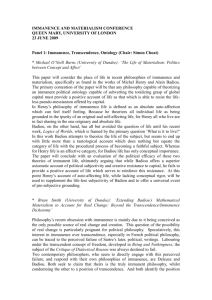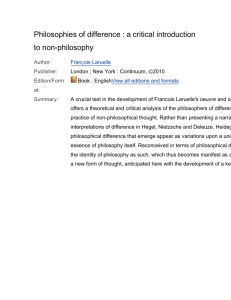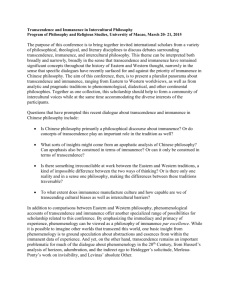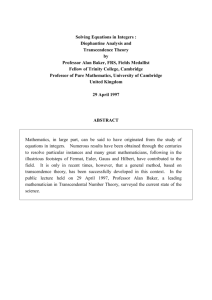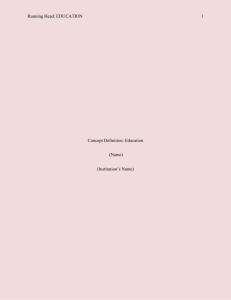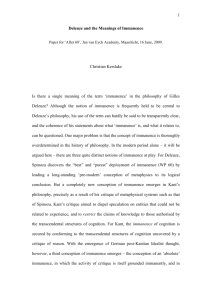Panel 3 - Queen Mary University of London
advertisement
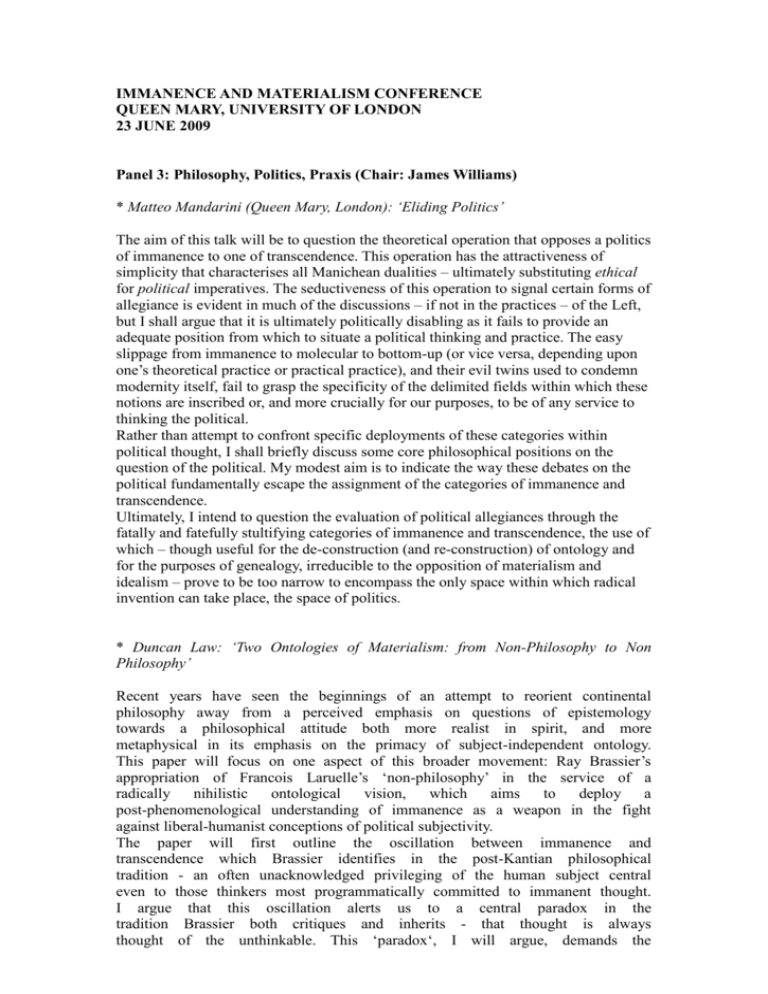
IMMANENCE AND MATERIALISM CONFERENCE QUEEN MARY, UNIVERSITY OF LONDON 23 JUNE 2009 Panel 3: Philosophy, Politics, Praxis (Chair: James Williams) * Matteo Mandarini (Queen Mary, London): ‘Eliding Politics’ The aim of this talk will be to question the theoretical operation that opposes a politics of immanence to one of transcendence. This operation has the attractiveness of simplicity that characterises all Manichean dualities – ultimately substituting ethical for political imperatives. The seductiveness of this operation to signal certain forms of allegiance is evident in much of the discussions – if not in the practices – of the Left, but I shall argue that it is ultimately politically disabling as it fails to provide an adequate position from which to situate a political thinking and practice. The easy slippage from immanence to molecular to bottom-up (or vice versa, depending upon one’s theoretical practice or practical practice), and their evil twins used to condemn modernity itself, fail to grasp the specificity of the delimited fields within which these notions are inscribed or, and more crucially for our purposes, to be of any service to thinking the political. Rather than attempt to confront specific deployments of these categories within political thought, I shall briefly discuss some core philosophical positions on the question of the political. My modest aim is to indicate the way these debates on the political fundamentally escape the assignment of the categories of immanence and transcendence. Ultimately, I intend to question the evaluation of political allegiances through the fatally and fatefully stultifying categories of immanence and transcendence, the use of which – though useful for the de-construction (and re-construction) of ontology and for the purposes of genealogy, irreducible to the opposition of materialism and idealism – prove to be too narrow to encompass the only space within which radical invention can take place, the space of politics. * Duncan Law: ‘Two Ontologies of Materialism: from Non-Philosophy to Non Philosophy’ Recent years have seen the beginnings of an attempt to reorient continental philosophy away from a perceived emphasis on questions of epistemology towards a philosophical attitude both more realist in spirit, and more metaphysical in its emphasis on the primacy of subject-independent ontology. This paper will focus on one aspect of this broader movement: Ray Brassier’s appropriation of Francois Laruelle’s ‘non-philosophy’ in the service of a radically nihilistic ontological vision, which aims to deploy a post-phenomenological understanding of immanence as a weapon in the fight against liberal-humanist conceptions of political subjectivity. The paper will first outline the oscillation between immanence and transcendence which Brassier identifies in the post-Kantian philosophical tradition - an often unacknowledged privileging of the human subject central even to those thinkers most programmatically committed to immanent thought. I argue that this oscillation alerts us to a central paradox in the tradition Brassier both critiques and inherits - that thought is always thought of the unthinkable. This ‘paradox‘, I will argue, demands the opening of metaphysics to an ontology which cannot be re-appropriated by any form of transcendental subject. I suggest that there are two general forms such an opening could take. The first is a radicalisation of philosophical immanence, which - though pursued by Brassier in the name of a nihilist anti-humanism - is, I argue, irreducibly implicated in the kind of transcendental mysticism we find in Laruelle‘s more religiously-oriented work. The alternative, I suggest, is an opening of metaphysics not to non-philosophy, but to non philosophy: to the everyday material world, and the social practices that produce both our subjectivity and our philosophical discourses. I suggest that a more fruitful form of politically-oriented immanent materialism is a fundamentally empirical - rather than speculative - analysis of the world we inhabit, interpret, and plan to change. * Michael Goddard (University of Salford): ‘Misrecognising Immanence: Towards a Critique of the Anti-Deleuzian Strategies of Badiou, Žižek and Hallward’ Alain Badiou's The Clamour of Being, Salvoj Zizek's Organs without Bodies and Peter Hallward's Out of this World: are a chain of related 'anti-Deleuzian' texts from the so-called Lacanian Left. While individually these texts have given rise to defences of Deleuze's thought from scholars such as Eric Alliez and Gregg Lambert, I want to argue that these texts need to be read together as so many strategies of refusing not only Deleuzian thought but also immanence itself and that they do so for very specific tactical reasons. Common to all these texts is the claim that the 'real' Deleuze is in fact contaminated with the transcendence and dialectics he seems to reject whether in the guise of Plato, Hegel or Mysticism and therefore to claim that while he pretends to be interested in the world and in politics he instead proposes an ascetic transcendence of both. This paper will seek to examine precisely what interests these various exorcisms of Deleuze and immanence are serving, beyond the obvious fact that they are clearly key elements of the self-promotion of both Badiou and Zizek (with Hallward riding on the coat-tails of the former) as key contemproary political thinkers. More than this, I will be arguing that these books are strategies of power or stratification that seek to shut down the radically democratic possibilities for a politics of immanence opened up by Deleuze's thought, especially in his works with Guattari, in order to reassert the priestly function of the psychoanalyst/expert/party militant. Despite the various gestures of these authors towards communism or radical politics, I will be arguing that in reality they constitute a disturbing 'great leap backwards' towards despotic forms of political practice and theory, for which the exorcism of the ghost of Deleuze constitutes a necessary first step: in Lacanian terms, 'anti-Deleuzianism' should therefore be seen as a symptom of rather than the opposition to the current neoliberalist and neo-conservative era.
